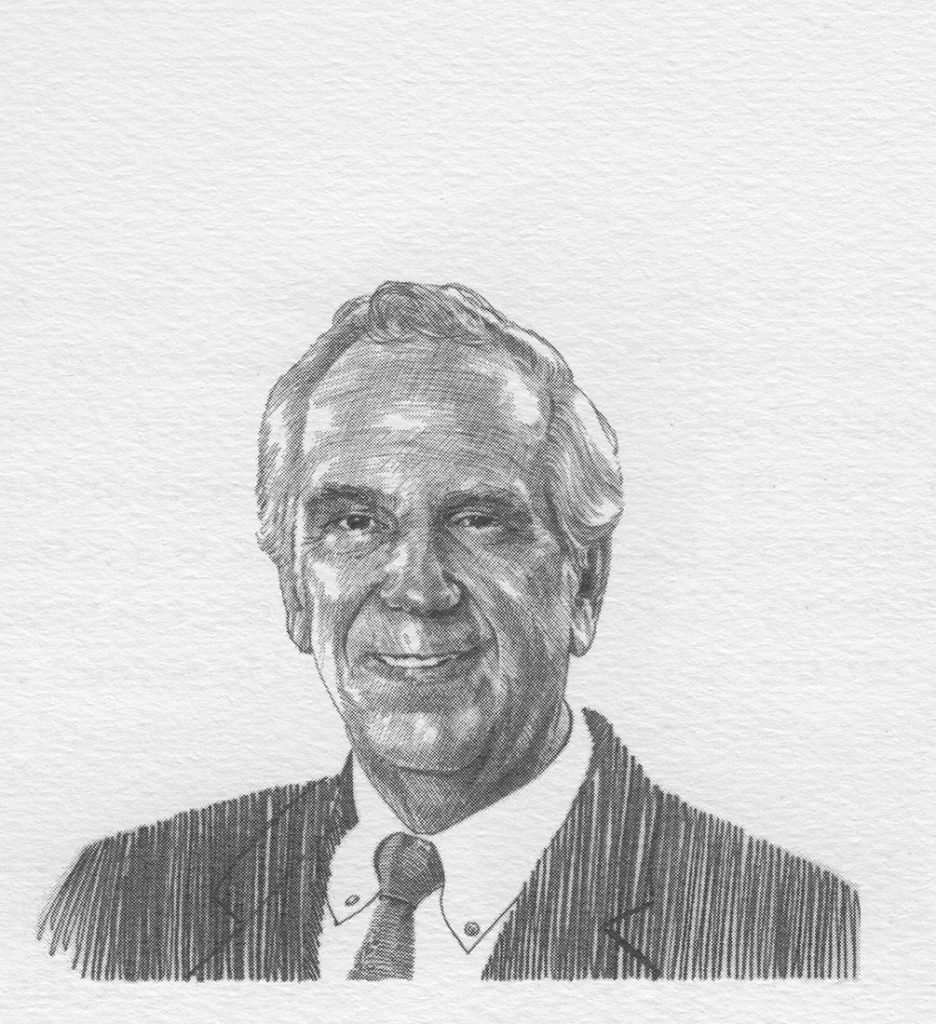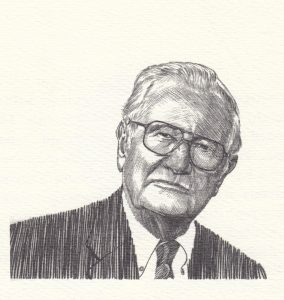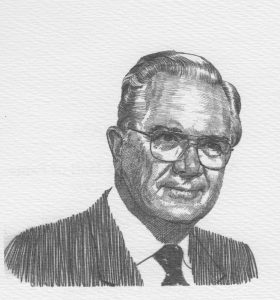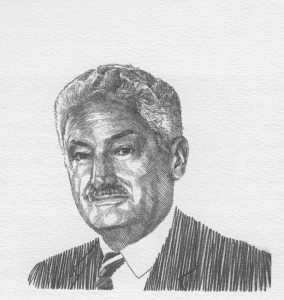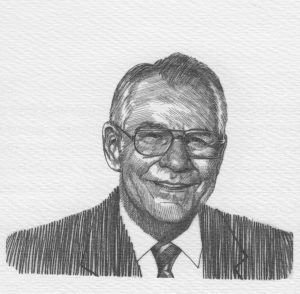Jimmy Harrison got his start in the pharmacy business working as a soda jerk in his daddy’s drugstore.
Some five decades and 153 stores later, James I. Harrison, Jr., chairman, and chief executive officer of Harco Drug Incorporated, made the difficult decision to sell his $258 million company and bring to an end an incredible family tradition.
James Irving Harrison, Jr., a native and lifetime resident of Tuscaloosa, Alabama, was born July 11, 1932, to James Irving Harrison, Sr., and Agnes Elizabeth Doherty. The young Harrison finished high school at age sixteen, then attended Baylor Prep School in Chattanooga, Tennessee, for a year before accepting a basketball scholarship to The University of Alabama. After two years at Alabama, he then transferred to Howard College (now Samford University) in Birmingham to study pharmacy – and keep playing basketball. The university’s athletic department still lists Jimmy as holding the school record for most points scored (48) in a basketball game. He was an honors student, inducted into such societies as Rho Chi, Kappa Psi, and ODK, and it was during this time that he and Peggy Thomas were wed, May 30, 1954.
He and his bride returned to Tuscaloosa upon graduation in 1955, at which time his father, who had successfully owned and operated downtown Central Drug since 1941, purchased a second store. The senior Harrison turned over the keys to Druid Drug, located on the edge of the University of Alabama campus, to his son and gave him the freedom to run the operation. The stores used separate bank accounts, with Jimmy’s father managing the finances and paying the bills for both stores. Many years later the son would recount part of that experience to an Alabama business magazine.
“After he had a stroke, he was unable to manage the finances anymore,” Jimmy said, remembering. “I took over the books and discovered he was making me look good by paying some of my bills out of his store. I had thought I was so smart.” In the late 1960s James Harrison, Sr., retired, and James Harrison, Jr., took over the family business, which by then consisted of four stores in the Tuscaloosa area. Chain drugstores were then beginning to make an impact on the country, and, as Jimmy said, “We had to choose whether to get involved in this type of expansion or get eaten by it.”
He made the right choice.
Under Jimmy’s direction, the company began its expansion as a chain in 1969 with its first Harco Super Drug in neighboring Northport. Next came a store in Clanton, still in Alabama, but the first store outside of the immediate Tuscaloosa area. Again, Jimmy’s own words tell the story best: “Back when we first started, there were times when our cash position was very weak. We made the joke that every time we sold a pack of cigarettes, we made a deposit. In the early days, when we had six to ten stores, we opened three stores a year on a very small base of stores. We didn’t know what a risk that was.”
While Jimmy was building his company, which would grow to have stores in Alabama, Mississippi, and Florida, he and Peggy were also building their family. The two would have three sons, James I. Harrison, III, Ronald Patrick Harrison, and Kie Anthony Harrison; and two daughters, Rebecca Elizabethanne Harrison Fuhrman, and Cheryl Lynn Harrison Sisson. The family would grow further in later years, with the devoted father becoming as well a devoted grandfather to eleven grandchildren.
The company officer would also become more and more active in his role as a civic and industry leader. An active member of Holy Spirit Catholic Church, he served at various points as a board member for Hospice of West Alabama, West Alabama Rehabilitation, Druid City Hospital Foundation, and the Alabama Institute for the Deaf and Blind. He is a past director of the Tuscaloosa County United Way and Tuscaloosa County Heart Association, and a current director of the Tuscaloosa County Chamber of Commerce. He is also currently chairman of the President’s Advisory Cabinet at The University of Alabama and a member of the UA Culverhouse College of Commerce and Business Administration Board of Visitors, and a member of the Samford University School of Pharmacy Advisory Board, as well as recipient of the 1987 Samford University Distinguished Service Award.
On the business front, he served as a board member for AmSouth Bank and Alfa Insurance, as past chairman of Affiliated Drug Stores and the Southern Drug Store Association, and on the executive committee of the National Association of Chain Drug Stores. Harco and Jimmy Harrison were named Employer of the Year by the Alabama Rehabilitation Association in 1996, Best Community Drug Store Chain 1995, and Retailer of the Decade (1990 award) by Chain Drug Review, as well as the 1986 Outstanding Small Drug Chain in the United States and America’s No. 1 Regional Drug Store Chain in 1996 by Drug Store News. He was recognized with a National Human Relations Award by the American Jewish Committee in 1997, the Bronze Oak Wreath Award for community contributions and involvement in 1990, and the Governor’s Volunteerism Award in 1989. He received the Alabama Gerontological Society Award for service to the elderly in 1986 and the Alabama Association of Elementary School Administrators Southeastern Award for contributions to education in 1996.
During the 1980s, Jimmy Harrison extended the family business to include a home health care business, Totalcare, with annual sales of about $6 million, which was sold in 1996 to American HomePatient; and Carport Discount Auto Parts, an automotive parts retail chain with forty-seven stores, which became a separate company in 1996. Even as the scope of the business expanded, however, Jimmy never forgot that operative word, “family.”
“We have always tried to run our business like a family, with a lot of interaction at all levels,” said the father whose five adult children all have roles within the operations. “Even though the family is much larger now we still strive to treat our associates with respect and with personal caring, just like you do in a family … keeping good people is very important in our business.”
But that business, one of tonics and powders and personal caring, is no longer theirs. In July of 1997, the announcement was made that Harco and New Orleans-based K&B would both become part of Rite Aid, in an acquisition estimated at worth $325 to $340 million. “I approached Jimmy Harrison,” said Rite Aid Chairman and Chief Executive Martin Grass, whose company is based in Camp Hill, Pennsylvania. “He was not aggressively selling the business.”
As his family’s business was nearing its fiftieth anniversary some years ago, Jimmy Harrison commented that he was only “a small part of what has happened. If I can take any credit, it’s in putting together a group of talented people.”
That group of talented people would probably disagree. History will record Jimmy Harrison as a leader in retailing, in pharmaceuticals, and in the ranks of family businesses. And those who knew him well will remember best his devotion to family, both immediate and extended – very extended.
“He’s always referred to the company as an extended family,” said son James I. Harrison, III. “The people who have worked for him would probably describe my dad as more of a father figure than a boss – he’s a mentor, a teacher, a warm human being.”

